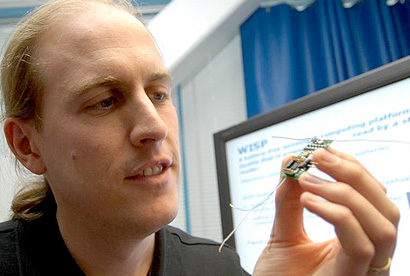Advances in information technology have some companies dreaming of a wo rld abuzz with sensors, some of which could reduce carbon emissions. How to power these sensors is one of the problems to be tackled. UW CSE associate professor Josh Smith, who recently moved from Intel Labs Seattle, has been working on this issue.
rld abuzz with sensors, some of which could reduce carbon emissions. How to power these sensors is one of the problems to be tackled. UW CSE associate professor Josh Smith, who recently moved from Intel Labs Seattle, has been working on this issue.
“‘That’s been a real problem for sensor units: People can build these sensor networks that send data wirelessly, but their battery only lasts a couple minutes,’ said Josh Smith.”
With some others, Smith has developed two technologies called WARP and WISP to combat this problem. He is the principal investigator of Intel’s WREL (Wireless Resonant Energy Link) project, which aims to transfer tens of watts wirelessly. He also leads a project called WISP (Wireless Identification and Sensing Platform). WISP is a battery-free platform for sensing and computation. It consists of a fully-programmable, 16-bit microcontroller that is powered wirelessly by radio waves: it harvests all the energy it needs from a standards-compliant UHF RFID reader. It also receives data from and sends data to the RFID reader.
Read the New York Times article here.

